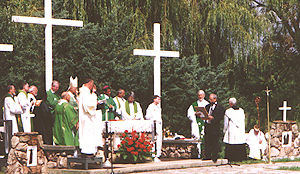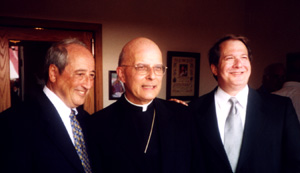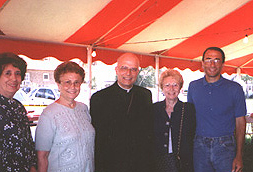Apostolic Office (by Father Edward Kilmartin, S.J.)
Christian liturgy differs from sacred drama not merely because of the mystery content but because the presence of Christ and his saving work takes place through rites which are a form of expression of the faith of the Church. But how are the dynamics of liturgical actions to be presented in such a way that they are clearly seen as social actions in which there is no complete disjunction between the representation of the mystery of salvation and the private lives of those involved in the action, the "actors," both minister and faithful?
The proper approach to the problem of the relation between faith and institution should begin with the fact that the content of office of the "chosen witnesses" of the Resurrection is the obedient exercise of their faith in Christ. Through the gift of faith Christ formed these witnesses into the community of believers sent in full power. By witnessing to their faith, the apostles are the way by which Christ becomes personally present to others and draws them into his Church.
Those who succeed the apostles as leaders of the Church derive their faith from the faith of the Church, which has its apostolic succession or tradition from apostolic office and the witness of all believers to their faith. Thus apostolic office, strengthened by the gift of the Spirit in ordination, is a special mode of exercise of the faith of the Church.
Christ's personal presence in word and sacrament is inwardly dependent on the exercise of this faith of the Church. This becomes clear when it is recognized that the apostles themselves were, properly speaking, not servants of the ipsissima verba Christi but servants of the word of God through the obedient exercise of their faith. The apostles--Paul especially makes this clear--recognized that they preached the word of God if they witnessed to their faith. Christ was understood to be present and acting because the preacher exercised the faith in which Christ is present as sharing source of faith.
The word of God exists in this world only in the form of a believing "Ant-Wort," as Langemeyer expresses it; and this holds for the sacraments of Christ. The forma sacramenti is the expression of the faith of the Church. Sacraments do not exist without the "ecclesial word of faith" which draws gestures of ordinary life into the realm of the celebration of the life of faith. The exercise of faith is the way by which the symbolic representations of Christ's special presence, derived from Christ as formative norm of its self-expression, are executed.
Within this perspective one sees clearly that pastoral office, by its mere presence, cannot account for a special presence of Christ in liturgical celebrations. The special presence of Christ is derived from what the community with its leadership does to express its faith. We can speak of the need for office in the celebration of the Eucharist in view of the fact that here the Church most perfectly manifests and realizes its true being. In the old Church it was the requirement of the symbolic correspondence between the comprehensive, ecclesial reality of the community and the Eucharist which dictated the presence of the pastoral office. Still, office is inserted into this special, ecclesial activity and so obtains a special qualification.
Of itself, office does not qualify the symbolic action in its symbolic function. Rather, the function of office to represent, foster, and maintain the unity of the Church becomes through its liturgical activity in a special way transparency for the proper grounds of the unity of the Church: Christ. Because the office bearer represents the Church united in faith and love in his role as leader, he represents Christ. Consequently, he acts in the name of but not by the commission of the local community, which is not completely identified with the Church eschatologically sanctified.
Liturgical actions are, first and foremost, a special form of expression of the faith of the Church. Through this representation Christ's presence as source of the faith is mediated--a presence more real and efficacious than the community's presence to itself. The special mode of Christ's presence derives from the fact that the liturgy is a festive exercise of the faith. Analogous to feasts of daily life, which serve as transparency for the permanent values hidden in ordinary living, the liturgy highlights the graceful realities less clearly recognized in the daily life of faith. Moreover, just as a family feast represents the whole family even in the absence of some members, so the ecclesial assembly represents the whole Church first and foremost by its festive character. The official servant of the unity of the Church, much in the way of a father of a family, becomes in a special way transparency for the grounds of the unity of the Church: Christ.
Yet, as Langemeyer states, "As servant and representative of the one Church, the priest acts in the celebration in a specific way in persona Christi. But he represents Christ, since he represents the Church united in faith and love."
The presence of Christ is given as personal presence through the faith of the Church. Therefore it obtains a certain objectivity. It is neither dependent on the faith of the minister nor on the faith of any particular community. But it is not indepently linked to definite institutions or actions. The obedience of Christ is the way by which the Lordship of God was fully inserted into the world; and the obedience of faith of the Church is the way by which Christ remains personally present and effective in the Church. The apostolic officer is a sacrament of the efficacious presence of Christ and the Spirit. But taking this statement a step further, and employing the Scholastic distinction between sacramentum, res et sacramentum, [and] res tantum, to express levels of signification, we should more accurately say: The apostolic officer is sacramentum of the Church united in faith and love, which in turn as res [et sacramentum] is also sacramentum of Christ and the Spirit, the res tantum. In this way, apostolic office is correctly ordered to the Church, sacrament of Christ, and to Christ, as sacrament of God.
Note from the editor: In speaking of sacraments, the Scholastics distinguished the visible sign, the sacramentum [in the Eucharist, the bread and wine], the essence of the sacrament, the res tantum [in the Eucharist, the presence of Christ], and the purpose of the sacrament, the res et sacramentum [in the Eucharist, the unity of the Church]. Here, in this context, Kilmartin is saying that the presider at the Eucharist is a visible sign, a sacramentum of the Church. In turn, that Church is itself a sacramentum of Christ and the Spirit, the essence or res tantum of the Church. To be sure, this double level of signification is not what the Scholastics said; it is, rather, what Kilmartin says. At the second level of signification, the author is saying that the essence of the Church is Christ and the Spirit. While Kilmartin's explanation of double signification makes sense, it seems that his use of these Scholastic terms may be neither faithful to their original context nor completly accurate in the secondary identification of the res tantum of the Church with Christ and the Spirit. On the other hand, that identification could be defended if we speak of the Church as the Body of Christ, head and members, and of the Church as the unity of the Spirit; in both cases, we are talking about the people of God. Now, all these terms are not used univocally; whatever is said of the Eucharist and the Church can only be said equivocally of the other sacraments. Furthermore, Kilmartin is using these terms only to illustrate his point, not to establish it. In a sense, Aquinas was doing the same thing with his own use of Aristotelian terms, for example, with hylomorphism. One is simply attempting to clarify the faith and illumine it by means of analogy.
A direct representation of Christ through the ministry of the Church would be possible only if there existed a ministry which could operate independently of the faith of the Church. The practical separation of potestas ordinis from potestas jurisdictionis in the West led to the theory of a complete disjunction between the two powers in the course of the Middle Ages. This theology contributed to the argument against the sacramental nature of the episcopal office and to the narrow cultic view of priesthood. In modern times, especially with the support of Vatican II, apostolic office is recognized as a pastoral office. Ordination is not conceived as bestowing an office of priest independently of [pastoral office].
As an activity of the Church, pastoral office can only represent and act in the name of the Lord when it represents the life of faith of the Church. Outside the ecclesial context, apostolic office cannot represent Christ. This statement is accepted today without question by Catholic theologians, many of whom, however, are unaware of the consequences for the representative role of office. Yet it was not always a working principle in School theology. The bizarre casus conscientiae concerning the consecration of bread in a shopwindow is a case in point. It was discussed at length by the respected medieval theologian Robet Holkot (d. 1349) and repeated down to this century in moral theology textbooks. Holkot accepted the possibility of such a consecration without question because he isolated the Mass from the Church. He made it a work of the priest, who exercises the power of orders independently of the faith of the Church. This perspective on the relation of the priest to the Mass was repeated by the few theologians who dealt with this theme during the fourteenth and fifteenth centuries.
The failure to recognize the necessity of a proper ecclesial context for the exercise of apostolic office also resulted in the acceptance of the theory of "absolute ordination" by medieval theologians and the magisterium of the West. Before the thirteenth century, a whole series of ecclesiastical and canonical conditions, involving both the bisho and the candidate, entered into the question of the validity of ordination, as C. Vogel has shown. Commenting on Vogel's analysis of the historical data concerning the relative importance of the rite of ordination, J. Ratzinger says that it does not "speak, as Vogel seems to accept, against the meaning of the laying on of hands, but for the indispensability of the sacrament, because it expresses the binding of office to the faith of the whole Church and the binding of the whole Church to the faith going beyond its own authority." This is correct and leads to the conclusion that apostolic office directly represents the faith of the Church.
Footnotes:
Baldovin, S.J., John. "The Sacraments: The Paschal Presence of the Bishop," Ceremonial of Bishops: A Reader. Washington, D.C.: United States Catholic Conference, 1994. Pp. 62-76, here, 62, 67.
Detscher, Alan F. "The Stational Mass: from Refinements to Renewal. Idem. Pp. 95-117, here, 102.
International Commission on English in the Liturgy. Ceremonial of Bishops. Collegeville, Minnesota: Liturgical Press, 1989.
Kilmartin, S.J., Edward J. "Apostolic Office: Sacrament of Christ," Theological Studies 36 (1975), 243-264, here, 257-261. See esp. his "theological consequences," 262-264.
[Copy has been slightly edited for consistency and correction. Emphasis supplied. Qui potest capere, capiat.]






 top
top